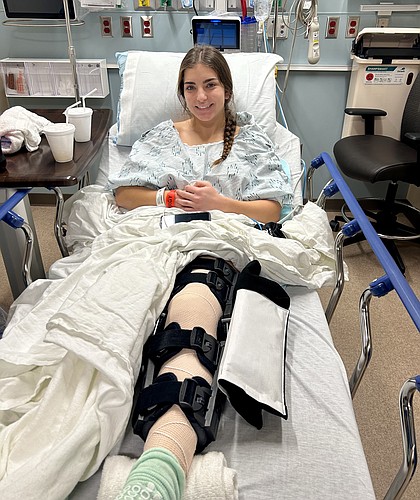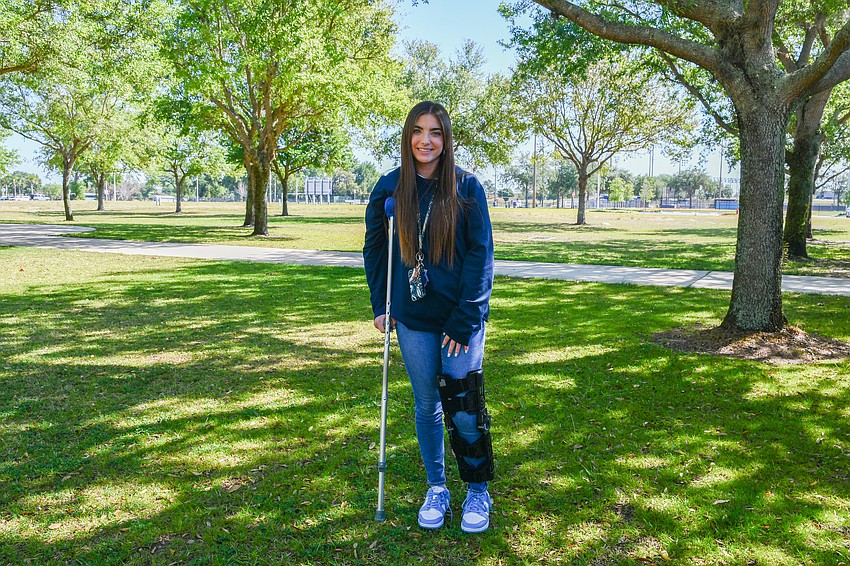- April 4, 2025
-
-
Loading

For Foundation Academy freshman and softball team outfielder Elena Friedman, half of her life has been spent on a field since she was 6 or 7 years old, as softball runs in her family.
“It originally started because I was at my brother’s T-ball practice and I wanted to swing a bat,” she said. “I was in sandals and like a maxi dress or something and I thought ‘You’re kind of good at this.’ So then, I went and I tried out. Both my grandpas coached softball. My aunt played all the way through high school, and she won a state championship at West Orange and my dad, he coached. So, it’s kind of like I’ve always been around softball.”
Last year, at only 14 years of age and still in middle school, Friedman led the Lady Lions’ varsity team with a .570 on base percentage and four triples, and was third on the leader board for runs with a total of 31 and a .684 slugging percentage. She was second on the leader board when it comes to doubles, with a total of six doubles for the 2021-22 prep softball season.
However, Friedman has continuously been struggling with knee pain and issues. It spurred from a genetic issue she was born with called Shallow Trochlear Groove that became prevalent within the last four years.
“I originally noticed it (one time) when I slid into third base and (the doctors) said I just sprained my ACL,” she said. “But, they also wrote in there that I had a shallow patellar groove — my kneecap was too shallow but they never did anything about it so I kept re-injuring it. And, every time I would get better I would do something (to hurt it again) and it was kind of just like a constant cycle of my knee never getting better and it would always swell.”
Friedman dislocated her knee two years ago and since then, it would never stay in place.
“I could just be walking and I would fall and it would never stay in place,” she said. “I’ve had to wear a brace for a really long time and the braces never did anything and I never understood why. … So it was just really frustrating because I would always get better and I would get back to softball and … then something would happen with my knee again.”
KNEE REPAIR
In order to help Friedman get back in shape, Dr. Daryl Osbahr performed a Trochleoplasty — a surgical correction of the femoral trochlea to help restore a normal entry of the patella into the groove during extension and flexion of the knee — earlier this year. Friedman had a couple more procedures on her left knee: a Medial Patellofemoral Ligament Reconstruction, which is a surgery that creates a new medial patellofemoral ligament to help stabilize the knee and protect the joint; a lateral reticular release and reconstruction to help relieve pressure in the joint.
This type of procedure is uncommon and has been done in the United States only for the last five to 10 years. Nowadays, there are only 10 to 15 surgeons in the U.S. that are able to perform the surgery.
Before deciding to undergo the procedure, Friedman had attended physical therapy three or four times to see if her knee would finally heal.
“I had tried that over and over and it didn’t get better,” she said. “It didn’t fix it, I tried the different braces, I tried the different taping methods and basically nothing helped. … (The doctor) basically said if I wanted to play softball again or wanted to be able to walk normally or function like a normal human, I had to do (the surgery).”
However, despite the surgery fixing the dislocation of the knee and the sliding of the kneecap — as the procedure literally dug out a whole new groove for Friedman’s kneecap to sit on —because of it being so rare and uncommon among athletes, there is no certainty that Friedman will be able to play softball in the future but, she already has been attending physical therapy at Rothman Orthopaedic Institute in Orlando.

“I’m going two times a week and it mostly consists of breaking the scar tissue in my knee and bending the knee, doing curls, riding a bike,” she said. “There’s like an electro machine that (my physical therapist) uses to activate my quads. … I’ve been doing the motion of a squat, it’s just not very deep, and then I also have exercises that I’m doing at home every day and then I also had a machine that I was using daily for four to six hours that was bending my knee for me.”
Friedman is truly hoping to go back to the softball field in the future, knee permitting. Despite all the physical therapy and the hospital visits however, she maintains a 4.0 GPA and keeps track of all her classes.
“She still has goals and she still has opportunities to achieve those goals,” her dad Matt Friedman said. “That’s playing Division I softball, that’s playing in an Ivy League (school). … Academically, we have no doubt she’ll be successful. Our hope is that she can get back out there on the field if that’s what she wants to do, but it’s up to her.”
Before the year started — and all the doctor appointments rolled in — Friedman had already realized she wants to become a surgeon later in life. This experience however, kind of magnified that inkling for her.
“I think it’s kind of really more of a reason that I should be a surgeon,” she said. “Because I feel like maybe I’ll be able to relate to people, especially those who have an ongoing issue that they may not be able to fix.”